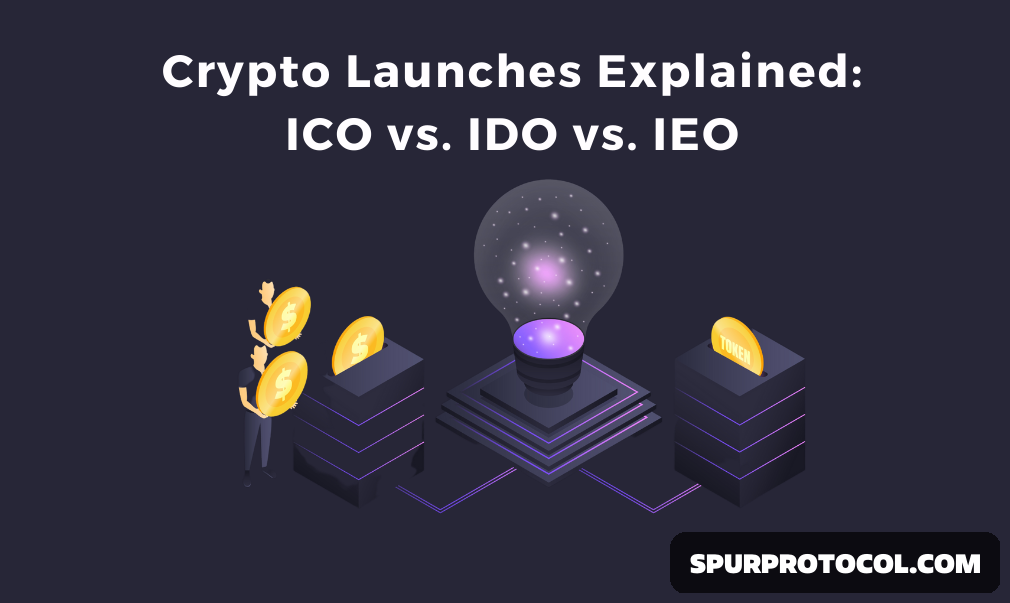What Are ICOs, IEOs, And IDOs?
ICOs, IEOs, and IDOs are some of the most common fundraising methods in the cryptocurrency and blockchain space. These fundraising mechanisms allow projects to raise capital while offering tokens to investors and users. However, each of these methods has its unique characteristics and processes. This article will explore what ICOs, IEOs, and IDOs are, how they work, and the key differences between them.
Go Back

🕒 8:18 PM
📅 Jan 17, 2025
✍️ By SpurProtocol
What Is an ICO (Initial Coin Offering)?
An ICO (Initial Coin Offering) is a method used by blockchain projects to raise funds by offering their native tokens to investors. ICOs are similar to an IPO (Initial Public Offering) in the traditional finance world, but instead of shares, participants receive cryptocurrency tokens. ICOs typically occur during the early stages of a project's development, providing capital to fund further development and marketing.
ICOs often require investors to send funds (usually in Ethereum or Bitcoin) to a project’s wallet in exchange for the tokens. These tokens are usually offered at a discounted rate during the ICO, with the expectation that their value will rise as the project grows.
Key Features of ICOs:
- Tokens are sold to the public.
- Projects raise funds through direct sales of tokens.
- ICOs have less regulatory oversight, which increases the risk for investors.
- Popular in the early stages of a project's development.
What Is an IEO (Initial Exchange Offering)?
An IEO (Initial Exchange Offering) is a fundraising method that differs from ICOs in that the sale of tokens occurs directly on a cryptocurrency exchange platform rather than the project's own website. This means the exchange acts as an intermediary between the project and investors, handling the token sale and ensuring that only eligible participants can join.
IEOs are generally considered to be more secure and trustworthy than ICOs because they are vetted by the exchange, which performs background checks on the project. The exchange also handles the fundraising process, reducing the chances of fraud.
Key Features of IEOs:
- Tokens are sold directly on a cryptocurrency exchange.
- The exchange acts as a third-party validator, reducing the risk for investors.
- Typically more regulated than ICOs, leading to increased trust.
- Funds are typically raised for projects already vetted by the exchange.
What Is an IDO (Initial DEX Offering)?
An IDO (Initial DEX Offering) is a more recent fundraising method that takes place on decentralized exchanges (DEXs). Unlike ICOs and IEOs, IDOs allow projects to list their tokens directly on decentralized platforms, allowing for a more decentralized and transparent fundraising process.
IDOs generally have fewer barriers to entry and allow anyone with a wallet to participate. They are also considered faster and more cost-effective because they are hosted on decentralized networks without the need for a central authority, such as a centralized exchange.
Key Features of IDOs:
- Tokens are sold directly on decentralized exchanges (DEXs).
- IDOs are generally decentralized and involve fewer intermediaries.
- Anyone with a compatible wallet can participate.
- Considered faster and cheaper than IEOs.
Key Differences Between ICOs, IEOs, and IDOs:
| Feature |
ICO (Initial Coin Offering) |
IEO (Initial Exchange Offering) |
IDO (Initial DEX Offering) |
| Fundraising Method |
Tokens sold directly by the project |
Tokens sold via a cryptocurrency exchange |
Tokens sold on a decentralized exchange (DEX) |
| Regulation |
Minimal regulation and oversight |
More regulation and exchange vetting |
Decentralized, with fewer regulatory barriers |
| Security |
Risk of fraud and scams |
More secure due to exchange validation |
Generally secure but decentralized |
| Access |
Open to anyone |
Limited to exchange users |
Open to anyone with a wallet |
| Speed and Costs |
Typically slower, with high costs |
Faster and more secure due to exchange infrastructure |
Faster and cheaper due to decentralized nature |
Which Method is Best for You?
Choosing between an ICO, IEO, or IDO depends on several factors:
- Security: If you’re looking for more security, an IEO might be the best option since exchanges typically vet the projects.
- Accessibility: If you prefer a more decentralized experience, an IDO might be appealing as it offers greater freedom to participate.
- Risk Tolerance: ICOs generally come with a higher risk since they lack the vetting process seen in IEOs or IDOs.
In Short:
ICOs, IEOs, and IDOs are all important methods of fundraising in the crypto space, each with their own advantages and risks. ICOs are suitable for projects looking for rapid growth but with minimal regulation, while IEOs offer more security and oversight. IDOs offer a decentralized and accessible approach, which can be perfect for projects seeking to engage a wider audience. Understanding the differences between these models is crucial for both investors and projects to make informed decisions.
